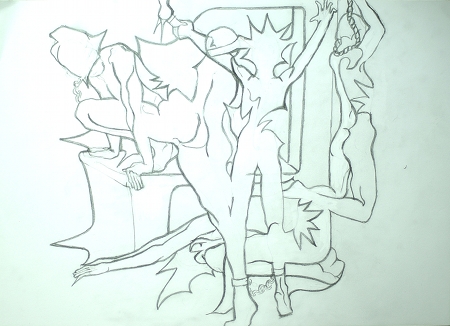Archive for the 'perception' Category
around teufelsee
Tuesday, October 19th, 2010On the occasion of the current convention on biodiversity some images from a green part of Berlin, called Teufelsee (the “satanic lake”) in the district of Köpenick.
Lost world of Old Europe at the Ashmolean
Tuesday, June 1st, 2010
The program in Oxford was very packed however I fastly managed to sneak into a museum. Thus before I go to Goettingen I fastly post some recommendation for a fantastic exhibition which is currently at the Ashmolean in Oxford called the “Lost world of Old Europe”.
about competition
Tuesday, March 2nd, 2010
A reader called Silvia Hossfehler asked about a statement I made in a blog post, in which I described a design of a chair that I had subbmitted to a competition. My statement there was “I do not like competitions.” And Silvia Hossfehlers question was:
Are you sure that you do not like competitions? So why did you then send in your suggestion?
Since I think this is a more general issue, I decided to make a blog post out of this.
There are three major aspects of a competition. One is filtering, one is evaluation and one is motivation. A competition is filtering since it is making a choice between the objects/subjects under competition. A competition is evaluating since this choice is usually done with respect to some “value scale” that is for example in the olympic games the value could be e.g. “high velocity” and the filtering is thus to filter out the fastest. However in an art competition for example the “value scale” is not so obvious, people may talk about “quality”, as a possible value, but usually in an art competition, the filtering is mostly subject to a quite unspecifyable/predictable “value scale”. The third aspect is that a competition may serve as fostering motivation, it may make people increase their commitment to a certain task. That is for example the runner in the olympic games may be running faster and giving his/her best due to the “competition”.
Likewise in the working world a competition may filter out “the most efficient/capable”, moreover usually competition is regarded as a necessary condition for motivating people to work hard enough. Efficiency and a motivated workforce is usually essential to make profits and since competition solves all these demands all at once it therefore is a kind of “must-have” for “capitalists”. Often enough the principles of evolution (“survival of the fittest”) are taken as a justification of these paradigmas. However it should be noted that there there are enough examples, which display that in evolution things are more complicated, in particular the “survival of the fittest” may not hold for the individual but for a group of species.
Nevertheless as a result our western society is highly “competition-oriented”.
In my point of view – especially by looking at the odd sides of competition, like for example where it is leading to things as exploitation or monoculture – this can be very problematic and I think a more critical view on competition as such may be at place.
It is of course more or less unavoidable to take part in competitions and unfortunately one has to go through quite some competitions in order to have a saying. Grades in school already constitute a “competition”. And again in this example a competition serves as an agent for “evaluation”.
On the other hand this example already makes it also clear that the above mentioned major aspects of a competition can at least partially be transferred to other means. That is an evaluation can also be done by purely measuring capabilities/competences, i.e. the competitive aspect of being compared to others can be reduced. Likewise motivation can be driven by interest, social connectivity etc. In short competition may not even be a necessary condition for efficiency. On the contrary if the competition and “optimization of efficiency” is too strong competition can be counterproductive (see e.g. the last Toyota crisis). Last but not least the “filtering” aspect of competitions may lead to a blindness for other “filtering” criteria. Thus if for example “fast profit” dominates the “value scale” for a competition other possible criteria, like social conditions etc. are going to be neglected. Moreover the conditions for filtering may be unfair/too restricted etc. (read also this randform post about competition in the academic world).
So yes my comment in the blog post was referring to all that but it was also expressing a subjective discomfort with competition, in particular for me competition is usually not the most motivating force. For example in school sports I was especially slow if I had to run with others. I do not object to evaluation, on the contrary a regular feedback is important for me, however I do not always need the comparision to others. The comparision to others may impose quite an extra stress, rather than motivation. This can go as far as this: If I notice that someone wants to challenge me for a competition I sometimes prefer to completely step back. In particular there are people who want to make everything into a competition. I find that unpleasant, since in these cases one has not only to decide about the issue in question, but also about the aspect, wether one is up for a competition.
I took part in this design competition mentioned in the blog post, because I actually would have liked to discuss my chair with others and get critics about the design etc. and eventually connect to people who might be interested in building a prototype (if you put your design just into a forum or on your blog than the response is usually not very big). So unfortunately in this competition nothing like that happened. Thats in part what I do not like about these usual competitions. Moreover there are more and more competitions, where you have to pay an entrance fee (apart from postage etc.) in order to present your work. I think this is crazy. Who is taking part in these competitions?
colt fashion
Friday, February 5th, 2010
I couldnt resist buying the above fashion item from a bargain-bin in Fukuoka, since it is on one hand a refreshing example of language use, but secondly because it displays an interesting connection between garment and power (here in a highly agressive way though). The T-shirt had been made by a factory called Slap Stick.
Impossible figures
Sunday, January 17th, 2010
Vlad Alexeev had created a website called Impossible World which collects “impossible figures”, from Vlad Alexeev’s website:
Since some time I became interested in such artworks and figures that look usual at a first sight, but there is something wrong with them if you look at them more attentively. For me, the most interesting such figures are “impossible figures” which make an impression that they cannot exist in a real world.
I wanted to know more and tried to find some information about these figures in the Internet. I found numerous sites containing three or four different impossible figures, but there was no site devoted exclusively to the study of impossible figures. During this pursuit I made the acquaintance of impossible figures of Swedish artist Oscar Reutersvärd and images of Dutch artist M.C. Escher.
midori vs aoui
Thursday, July 23rd, 2009Our friend Sophie Molholm coorganized recently a conference in multisensory research. Looking at the conference announcement I felt inspired to ask myself again to what extend rational cognitive instances do influence perception. An example: A traffic light in the western world is usually considered to have the colors red-yellow-green (or at least red and green (although the new LED lights look kind of bluish)). However I think it is important to note that in japaneese the green color for a traffic light – is not “MIDORI” (green), but “AOUI”, which is BLU! Did this make japanese people more prone to call something green-bluish “blue” instead of green? Doing experiments for this example might be difficult due to the ethnic pecularities, but I am sure there exist other examples and probably even studies on that subject.
here a little collection of randform posts related to the subject:
naming-gaming: evolution of languages
wirepullers: artwork challenging salience
manicone: artwork challenging 4 dimensional space perception
focus and context, part I: evolution and knowledge formation
focus and context, part IV: A Physicist Experiments With Cultural Studies: knowledge formation in humanities vs natural sciences
Le manoir du diable: conscientious coloring of astronomical data
common sense: designing computer minds at media lab
canny skinny skin scans perception and quantum computing (see also focus and context, part IIa: A quantum computation game)
error incognito:perception and space
Dreammachine: psychadelic effects in neuroscience
uncanny paintings: link to an experiment using facial expressions as a feedback interface for a painterly rendering algorithm
visualizing meaning: link to a survey concerning the usefulness of diagrams and charts in knowledge building (and a funny comment to that)
Lucifer’s toy lab
Wednesday, July 15th, 2009international cafes
Sunday, January 18th, 2009a post about austrian/german cuisine
